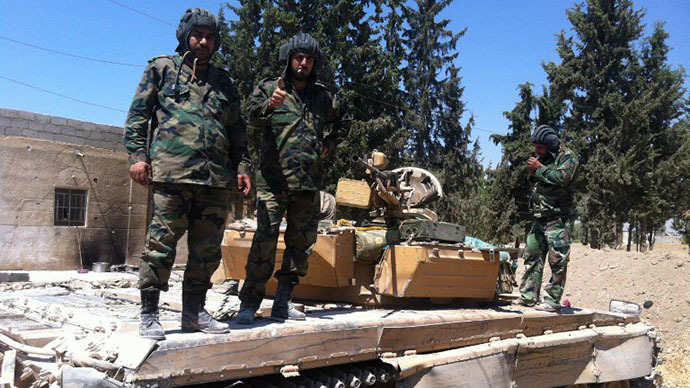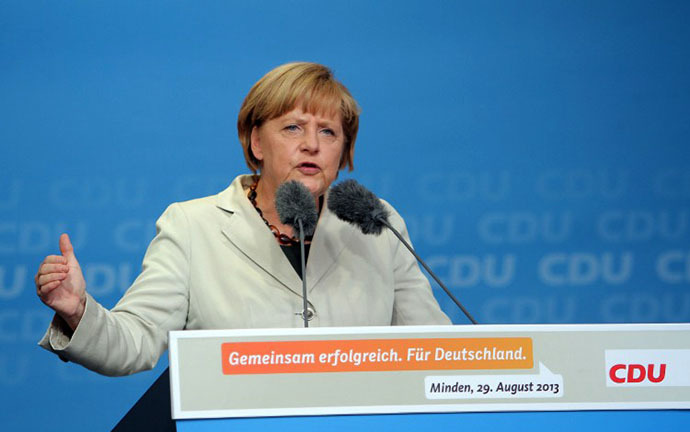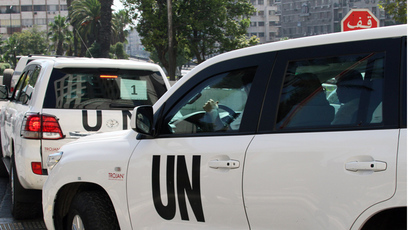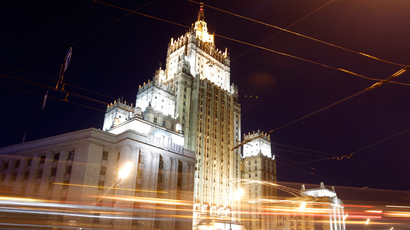Syria says it's ready for attack 'at any moment'

The Syrian government says it's expecting a military attack and is "ready to retaliate at any moment," according to a security official who wished to remain anonymous. The US holds Syria accountable for using banned chemical weapons and threatens payback.
Follow RT's LIVE UPDATES on Syria 'chemical
weapons' crisis
"We are expecting an attack at any moment. We are ready to retaliate at any moment," the security official in Damascus told AFP.
The Syrian Prime Minister also stated readiness for any possible
foreign strikes against it, saying that: “The Syrian army is
fully ready, its finger on the trigger to face any challenge or
scenario that they want to carry out,” in a written statement
which was broadcast on television.
This comes as the UN chemical inspection team finished its work
in the Arab country and headed to the Hague with samples taken at
the sites of alleged chemical attacks. Earlier, UN
Secretary-General Ban Ki-moon said it may be two weeks before for
final results of their analysis are ready.
The US, which has been mulling a military strike on Syria, said
they would not attack while the UN team was still in the country.
Following State Secretary John Kerry's Friday Speech, French
President Francois Hollande however declared that a strike could
come by September 4.
US intelligence agencies claim that a chemical weapons attack
near Damascus on August 21 killed a total of 1,429 Syrian
civilians, including 426 children. The intelligence gathered for
the report, revealed Friday, allegedly featured an intercepted
communication by a senior Syrian government official familiar
with the attack as well as other human, signals and satellite
intelligence. The report stated that President Bashar
Assad’s was allegedly responsible for the attack. President
Barack Obama used the data to make the case for retaliation
against the Syrian government.
On Saturday, Russia’s president, Vladimir Putin, declared that
the idea that the Syrian government had used chemical weapons on
its own people was "utter nonsense". Calling the attack a
"provocation" by Middle East forces seeking to get the US
involved, he urged Washington to present its evidence to the UN
Security Council.
At a meeting on the same day between Russian Deputy Foreign
Minister Sergey Ryabkov and US Ambassador in Russia Michael
McFaul, "it was emphasized that the report by the working
group of international experts in Syria shall be subject to
consideration by the Security Council," Russia's Foreign
Ministry said.
Russia also clearly stated that "any military action against
Syria by the US, bypassing the UN Security Council, would be an
act of aggression and a flagrant violation of international
law."
Russia and China have vetoed three resolutions that would increase pressure on Bashar Assad since the start of the war conflict in spring 2011. They are also against a current proposal by the US, the UK and France (the three Western permanent members of the Security Council) for a resolution that would allow military action against Syria over a chemical weapons attack which the West blames on the regime, and the government blames on the rebels.

Earlier this week German Chancellor Angela Merkel criticized
Russia and China over their stance in the Syrian crisis.
"It is very regrettable that Russia and China have refused for
some time to come to a common position [with Western partners] on
the Syrian conflict. This considerably weakens the role of the
United Nations," Merkel said in an interview with German
newspaper Augsburger Allgemeine, published Saturday.
Merkel ruled out German participation in any military action
without international approval.
"Germany cannot participate in any military intervention
without a mandate from the United Nations, NATO or the EU,"
added Merkel, who is seeking re-election as chancellor for a
third consecutive term in late September.
A poll published Thursday showed German public opinion against
military action by the West in Syria, with about three-fifths
opposed to any potential strikes, and only about one-third in
favor of military intervention.
Another poll showed that most French people do not want France to
take part in military action on Syria, either, and that most do
not trust French President Francois Hollande to do so. A BVA poll
released by Le Parisien-Aujourd'hui en France, showed that 64
percent of respondents opposed military action, 58 percent did
not trust Hollande to conduct it, and 35 percent feared it could
"set the entire region [Middle East] ablaze".
The French president said that Britain's parliamentary vote,
which rejected a motion authorizing military action in Syria on
Thursday, would not affect France's own actions, however.
Hollande, whose popularity has been affected by the economic
slowdown, showed unexpected military vigor when he dispatched
troops to help Mali's government fend off Islamist rebels earlier
this year in Africa, an intervention then backed by two-thirds of
the French public.
On Thursday, British lawmakers voted against military
intervention in Syria by a 285- to-272 margin, rejecting the
government’s motion to support military action against Syria in
principle. The motion came after Cameron made his case in favor
of missile strikes and many in Parliament cast doubt on his
assertions. "It is clear to me the British Parliament,
reflecting the views of the British people, does not want to see
British military action," Prime Minister David Cameron said.
"I get that and the government will act accordingly.”














